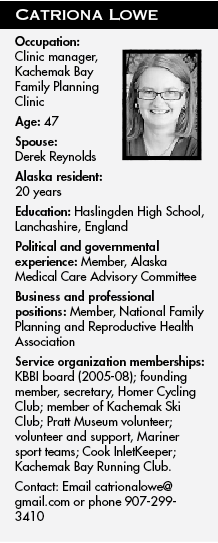A founding member of the Homer Cycling Club, Catriona Lowe has a gimmick not seen in previous Homer elections: She rides her bicycle around town with a campaign sign on the back.
Lowe, 47, decided to run for Homer City Council a few days before a recent life change. On Aug. 9, she married Derek Reynolds, a fellow cycling club member and biking enthusiast and owner of Cycle Logical, a bike sales and service shop on Kachemak Drive. From a previous marriage, Lowe has two teenage sons, Ian and Dexter.
Born Catriona Greenop in Lancashire in the north of England, Lowe graduated from Haslingden High School. Her mother is from the Isle of Man. One of Lowe’s ancestors was a newspaper editor, the last person imprisoned on the Isle of Man, for sedition.
“I love that part of my heritage,” Lowe said.
Lowe came to the United States in 1990 as an au pair worker in Fairfax, Va., and has been a U.S. citizen since 1999. From 1991-94, she lived in Bend, Ore., where she became an avid snowboarder. She came up to Alaska for the summer, and when she found Alyeska Ski Resort in Girdwood had snowboarding, stayed for the winter. Lowe met her first husband, Mike Lowe, in Girdwood and they came to Homer. In early 1995, she started Catzenjammer’s, a coffee shop at the corner of Bartlett Street and Pioneer Avenue that’s now the Legislative Information Office.
The shop lasted two years, and she moved to Anchorage for several years, where son Ian was born. The Lowes moved back to Homer and from 1999-2000 Lowe worked at the Pratt Museum. While her sons were young, she was a stay-at-home mom. After getting divorced in 2002, she re-entered the work force, landing a job as clinic manager at Kachemak Bay Family Planning Clinic.
“I think it was the best job I could have gotten,” she said. “The ways that family planning has enriched my world, the things you learn from clients providing care, listening — all of those things help you as a parent, in a relationship, help you run for city council.”
Lowe got involved in politics at the advisory level when she was offered a seat on the Alaska Medical Care Advisory Committee, or MCAC, a group that solicits input from people receiving or providing Medicaid assistance. When the MCAC met in Homer in 2008, Lowe went to testify. She had blue hair then and wondered if the MCAC would take her seriously.
“They liked my ideas and what I said,” Lowe said. “The next day I got an email saying ‘Would you consider being on our committee?’”
Lowe got appointed by the commissioner of the Department of Health and Human Services and just was reappointed to a third term.
As a parent, Lowe volunteered as a classroom assistant four hours a week for 11 years while her children were in elementary school. She’s taught snowboarding for the Kachemak Ski Club and organized its successful Warren Miller ski film fundraisers. With Ian on the Mariner football and wrestling teams, she also has volunteered as a team booster — but on the field.
“If someone has a great idea, they shouldn’t expect someone else to do it if they’re not prepared to be part of the doing,” she said of volunteer service.
Lowe said she sees the role of a council member as “seeing the big picture.”
“Representing the whole community,” she said. “That’s why I think it’s really important for people to let me know what they’re thinking. They elect me to represent them, but I can’t mindread.”
While she has interests like nonmotorized trails, Lowe said a council member has to step back from those interests.
“I’m going to sit there learning about the other things that are not my passions,” she said. “I’m skilled at doing that.”
Another skill she brings is building consensus and mediating, Lowe said.
“I can totally see both sides, see other sides and see the overlap and what both sides have in common,” she said.
Topping her to-do list “is to get comfortable behind the table and learn.” That’s one reason she’s been attending council meetings.
Police, fire and roads are her top budget priorities, but she also said she doesn’t want to see things like a strong recreation program and Homer Foundation support to nonprofits go away.
“Maybe there will be less work for the police to do if we keep strengthening what makes people proud to be part of the community and keeps them engaged,” she said.
Homer’s greatest strength is the diversity of the people who live here and their occupations, Lowe said.
“We’ve got the people who have been attracted to live here and the people who have grown up here — you have to make an effort to get here or stay here,” she said. “That’s a huge strength.”
One of Homer’s weaknesses is that the larger community is not the city itself, which makes financing programs challenging.
“We have to explore involving the larger Homer community, particularly when we’re talking about what’s viewed as things that are more wants than needs,” she said.
Michael Armstrong can be reached at michael.armstrong@homernews.com.
Lowe: Sees role as representing everyone


